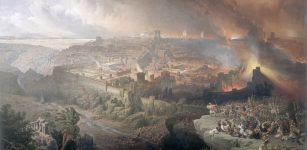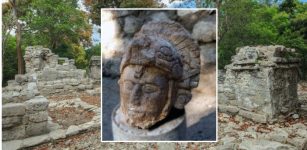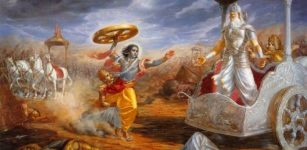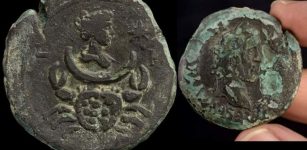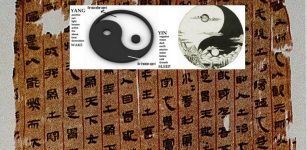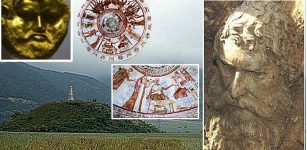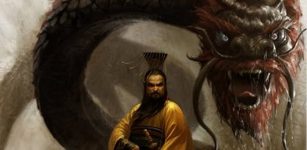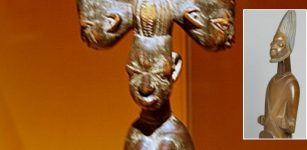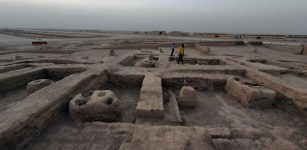Controversial Theory Suggests Ancient Egyptians Were Founders Of Chinese Civilization
AncientPages.com - A highly controversial theory put forward by a Professor suggests ancient Egyptians were founders of Chinese civilization. This may sound very odd and surprising to many because at first glance it appears as if these two ancient civilizations have very little in common.
However, ancient texts and studies of topography have led the Professor to conclude ancient Chinese were in fact migrants from Egypt.
Sun Weidong is a geochemistry Professor at the University of Science and Technology in Hefei, Anhui, China who is also interested in ancient history. While studying ancient classical Chinese texts and the topography of the of the Xia empire that is traditionally regarded as China’s founding dynasty, dating from 2070 to 1600 B.C., he noticed something puzzling.
In his opinion, there is a very close relationship between ancient Egyptians and the ancient Chinese.
“Northwards the stream is divided and becomes the nine rivers,” wrote Sima Qian in his first century historiography, the Records of the Grand Historian. “Reunited, it forms the opposing river and flows into the sea.”
Professor Sun Weidong says this can be interpreted as that the stream” in question wasn’t China’s famed Yellow River, which flows from west to east. There is only one major river in the world which flows northwards and that is the Nile, according to Professor Sun Weidong.
Professo Sun Weidong conducted radiometric dating of ancient Chinese bronzes and discovered to his surprise that their chemical composition more closely resembled those of ancient Egyptian bronzes than native Chinese ores.
Both Sun’s ideas and the controversy surrounding them flow out of a much older tradition of nationalist archaeology in China, which for more than a century has sought to answer a basic scientific question that has always been heavily politicized: Where do the Chinese people come from?
Sun argues that China’s Bronze Age technology, widely thought by scholars to have first entered the northwest of the country through the prehistoric Silk Road, actually came by sea. According to him, its bearers were the Hyksos, the Western Asian people who ruled parts of northern Egypt as foreigners between the 17th and 16th centuries B.C., until their eventual expulsion.
He notes that the Hyksos possessed at an earlier date almost all the same remarkable technology — bronze metallurgy, chariots, literacy, domesticated plants and animals — that archaeologists discovered at the ancient city of Yin, the capital of China’s second dynasty, the Shang, between 1300 and 1046 B.C. Since the Hyksos are known to have developed ships for war and trade that enabled them to sail the Red and Mediterranean seas, Sun speculates that a small population escaped their collapsing dynasty using seafaring technology that eventually brought them and their Bronze Age culture to the coast of China.
See also:
Scots – Descendants Of Lost Race From Sahara – DNA Reveals
New Controversial Evidence – Ancient Chinese Visited America 2,500 Years Ago
Professor Sun Weidong’s theory is very controversial and he has already received a lot of criticism.
Anticipating his critics, Sun said that to examine the roots of Chinese civilization may seem ridiculous in the eyes of some, because historians long ago stated clearly: We are the children of the Yan and Yellow Emperor.”
Historian Sima Qian took these legendary figures as the progenitor of the Han Chinese; and the Yellow Emperor’s great-grandson, Yu the Great, as the founder of the semimythical Xia dynasty. These served as the origin stories for imperial China and continued to be credited for decades after the Republic replaced it in 1912, so that even the nation’s most iconoclastic and rebellious sons — Sun Yat-Sen, Chiang Kai-Shek, and People’s Republic founder Mao Zedong among them — have at some time or other felt the need to pay their respects at the Yellow Emperor’s tomb. Even now, the oft-repeated claim that Chinese civilization is approximately 5,000 years old takes as its starting point the supposed reign of this legendary emperor.
Sun found the ancient Chinese and Egypotian link in the 1990s when he was a Ph.D. student in the radiation laboratory of the University of Science and Technology. Of the 200 or so items of bronze ware he was responsible for analyzing, some came from the city of Yin. He found that the radioactivity of these Yin-Shang bronzes had almost exactly the same characteristics as that of ancient Egyptian bronzes, suggesting that their ores all came from the same source: African mines.
Perhaps anticipating serious controversy, Sun’s doctoral supervisor did not allow Sun to report his findings at the time. Sun was asked to hand over his data and switched to another project. Twenty years after the start of his research and now a professor in his own right, Sun is finally ready to say all he knows about the Yin-Shang and China’s Bronze Age culture.
AncientPages.com






